With high profile films like Oblivion, AfterEarth, and Elysium offering up new (or recycled) visions of humanity’s hopeless future, 2013 might go down as the Summer of Doom. It’s worth noting, however, that dystopian sci-fi not only isn’t new, it’s the bedrock of the genre. After all, Fritz Lang’s 1927 Metropolis—which hypothesized a dehumanized future society not far removed from the those presented in today’s would-be blockbusters—is considered by some scholars to be the first fully-formed, feature-length science fiction film. For as long as filmmakers have dreamed of the future, they’ve presented nightmare scenarios of the world to come, and in the years since Lang’s masterpiece, filmmakers and audiences alike have never seemed to lose their enthusiasm for the end of the world—or, at least, the end of the world as we know it.
Dystopian science fiction comes in many shapes and sizes. Some are multi-million dollar behemoths, while others are quiet character studies. We can see the varieties of these films falling into two broad categories:
Visions of Apocalypse
One fascinating point of connection between religion and science fiction is the emphasis on the end of the world. In some respects, post-apocalyptic flicks are just eschatology with a budget. Here then are notable visions of the end:
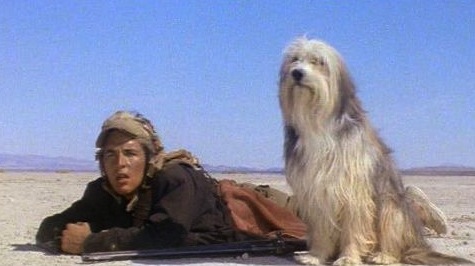
A Boy and His Dog (1975)
Directed by the great character actor L.Q. Jones (Ride The High Country, Casino) and based off a sequence of short and long form stories by Harlan Ellison, this bizarre hallucination unfolds in the heat of a fever dream. Part sci-fi, part sex comedy—it’s the rare dystopian flick that seems to be gleefully rooting for the end of the world, which might explain why it’s become a nihilistic cult classic.
See Also: The Bed-Sitting Room, Delicatessen
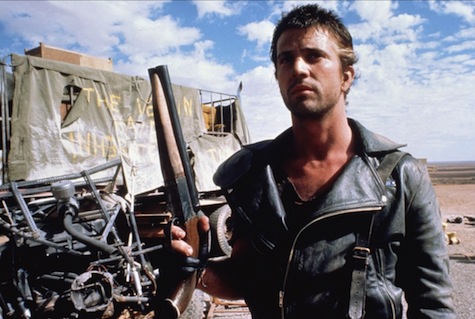
The Mad Max Trilogy (1979/1981/1985)
George Miller’s genius was to marry his dystopian vision to the pace of the car-based action films of the late seventies and early eighties. With 1981’s The Road Warrior, he achieved something close to a perfect synthesis. Laconic Mel Gibson—still handsome, Australian, and marginally sane—is a leather clad Shane figure, coming to the aid of some gas-hoarding homesteaders against psychotic gangs decked out in armor and studded jock straps. The Road Warrior is so influential it has become the central cinematic touchstone of the apocalypse. Next year brings a reboot shrouded in secrecy and starring Tom Hardy.
See Also: Waterworld, The Postman, The Book Of Eli

Testament (1983)
Want to see a realistic vision of the world we might live in after the bombs drop? Check out this quiet, brilliant little movie from director Lynn Littman and writers Carol Amen and John Sacret Young about a small town community pulling together (and falling apart) in the wake of a nuclear conflict. No special effects, no action. Just human beings confronting food shortages and radiation poisoning—and a complete reconfiguration of American life.
See Also: Seeking A Friend For The End Of The World, The Children Of Men, The Road
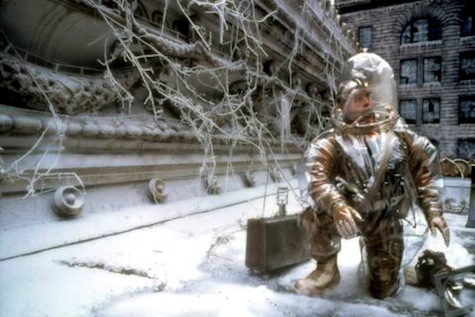
12 Monkeys (1995)
Terry Gilliam’s brain-twisting time travel movie holds up exceedingly well after almost twenty years. If anything—given the latest headlines about chemical weapons—it seems more prescient that ever. Bruce Willis’ beautiful performance as a haunted man from the future excuses a lot cinematic sins (including the last two Die Hard films), while Madeline Stowe, Brad Pitt, and Christopher Plummer fill the margins of the film with odd character touches. The most compelling thing here, though, is the film’s dogged devotion to its bleak vision. No heroes changing history here, just human beings caught up in the brutal indifference of time itself.
See Also: La Jetee, The Omega Man, I Am Legend
Visions of Subjugation
Perhaps the most persistent dystopian vision is the subjugation narrative. This goes back to Metropolis, and has its literary roots in epics like H.G. Wells’ The Time Machine and Jack London’s The Iron Heel. If the Apocalypse narrative presents the world in freefall, the Subjugation narrative presents the opposite—a vision of the future that is tightly controlled, claustrophobic and restricted along the lines of race, class, or genetics.
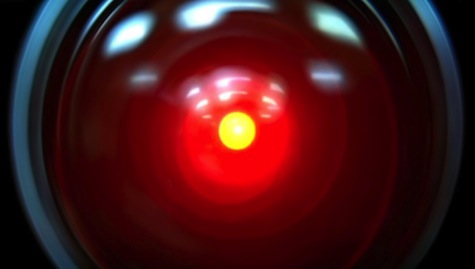
2001: A Space Odyssey (1968)
Stanley Kubrick’s sci fi epic (based on stories by Arthur C. Clarke) broke so much ground in terms of effects and cinematic craft that it’s easy to overlook that the film’s most daring element is its tone. Here is a film with no stars, no real protagonist to root for—indeed, no real sense of connection to humanity itself. By the time the spaceship computer HAL 9000 becomes self aware and tries to kill its crew, the audience is pretty much on its side. Villain that he is, at least HAL has a personality.
See Also: THX 1138, A.I.: Artificial Intelligence

Blade Runner (1982)
Director Ridley Scott and writers Hampton Fatcher and David Webb Peoples adapted Philip K. Dick’s novel Do Androids Dream Of Electric Sheep? into a mystery-romance that is more of a subdued character study than an action film. The subjugation here is corporate and imposed from a distance. This mood of oppression, mixed with dark visuals and rain-splattered sets, makes Blade Runner the preeminent sci-fi noir.
See Also: Dark City, A Clockwork Orange, Escape From New York, RoboCop

The Terminator (1984) and Terminator 2: Judgment Day (1991)
Director James Cameron took the rise of the machines plot and married it to the let’s-blow-shit-up ethos of the early eighties action flick. With T2, he created an action film so pitch perfect that it shames all the lackluster sequels and rip-offs that followed in its wake. Even overexposed and sucked dry of their original meaning, the first two Terminator films still hold up.
See Also: The Matrix
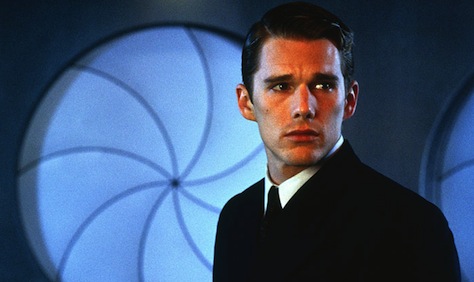
Gattaca (1997)
Here is a dystopian sci-fi of ideas, a vision of a world ruled by genetic modification and notions of racial purity. Ethan Hawke stars as a man from society’s genetic underclass, who attempts to infiltrate an exclusive program for space travel. Another film that seems curiously in sync with today’s headlines.
See Also: District 9, Elysium, The Hunger Games
Jake Hinkson is the author of the novels Hell On Church Street and The Posthumous Man. He blogs at The Night Editor.










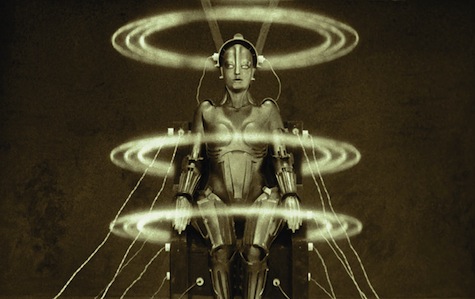
Turner Classic Movies’ website has an intersting article on the making of A Boy and His Dog, including the shocking revelation that the dog, Blood, is played by none other than the Brady Bunch’s Tiger. Also, does anyone consider it cheating when the post-apocalypse theme is wedded to the subjugation theme, as in The Terminator, The Hunger Games, or V for Vendetta? Is this an artificial way to create drama that allows the storyteller to skip over creating a more nuanced rationale for how an orderly, free society crumbled?
The only movie as hard to watch as Testament that I’ve seen would be Ingmar Bergman’s Shame. Great, but hard. There are moments in Testament which I fully get only now that I’ve had a child. I’d add one to your See Also: Miracle Mile.
(I’d like to see Shame again, for some values of like. It’s an end of the world story of a mostly non-SF sort.)
By Dawn’s Early Light was a decent near or light apocalypse movie.
I think Threads has Testament beat all to hell if you want a good, depressing apocalypse.
Hard to imagine a reboot of “The Road Warrior” surpassing or even equaling the original –
In a summer movie season where even the comedies were apocalyptic (This is the End, The World’s End), it amuses me to no end that one of the few films that wasn’t about the end of the world was the Roland Emmerich offering.
As much I would dislike to be that commenter, what about Alphaville?
2001 and The Terminator simply aren’t dystopian films. 2001 isn’t a dystopia at all (more of a bland utopia), and in the Terminator films the future world ruled by Skynet is off screen and the world is set in the present day. It’s not as if there weren’t dozens of valid candidates to choose from.
I expected to see Brazil in the second list. 2001 is too optimistic, if antiseptic, to be a dystopia.
Bleak is chic, puhleez! I for one would like to see the obsession with dystopia and zombies and comic book silliness die out, and see a renaissance of the golden age of SF sense of wonder and hope for a better (not perfect) world to come. Aren’t we better than this?
nomadUK, I completely agree. _Threads_ is stunning and so disturbingly plausible it still roils my dreams from time to time decades later. (And I didn’t watch it until after the end of the Cold War: what its effect must have been on intended audience I can only imagine.)
But it wasn’t a big-budget Hollywood movie so it wouldn’t find its way onto a list like this one.
Oh, and, btw, 2001 wasn’t ‘based on stories by Arthur C. Clarke’ except if you mean _The Sentinel_, which is only a single story, so the plural is wrong. Both Clarke and Kubrick are on record as saying that the book and film of 2001 were written simultaneously, so in a sense the book is a novelization of the film *and* the film is a film of the book, at the same time. The film is *not* ‘based on’ the novel in the sense you seemed to mean.
Dwelden, you’re absolutely right. Optimism seems to be in short supply in these fast-changing and challenging times. A clever Sci-Fi writer or movie maker who could create a future most of us would like to live in would do pretty well (See Also: Star Trek). Even Starship Troopers, cheap and nasty and war-centric as it was, at least showed us a vision of the future where the end of civilization is not inevitable. I wish I could think of more critically acclaimed examples but right now I can’t.
Who really wants dystopian Sci-Fi to be the”bedrock of the genre” anyway?
@11: As well as “The Sentinel”, the opening section of the novel (“Primeval Dawn”) is a reworking of Clarke’s 1953 story “Encounter in the Dawn”.
@12: I was reading the Amazing Stories interview with KSR, where he said that all dystopias are fundamentally the same, while utopias “force us to think about what we are”. In general, I find both pure u- and dystopias somewhat suspect and prefer a more realistic view of the human future.
Mr Gibbon: In addition to Star Trek (at least before the latest movies which have no soul), I would remind you of the original Star Wars trilogy and the redemption of Annakin, The Lord of the Rings, even Independence Day are all recent examples that there is more to SF than nihilism.